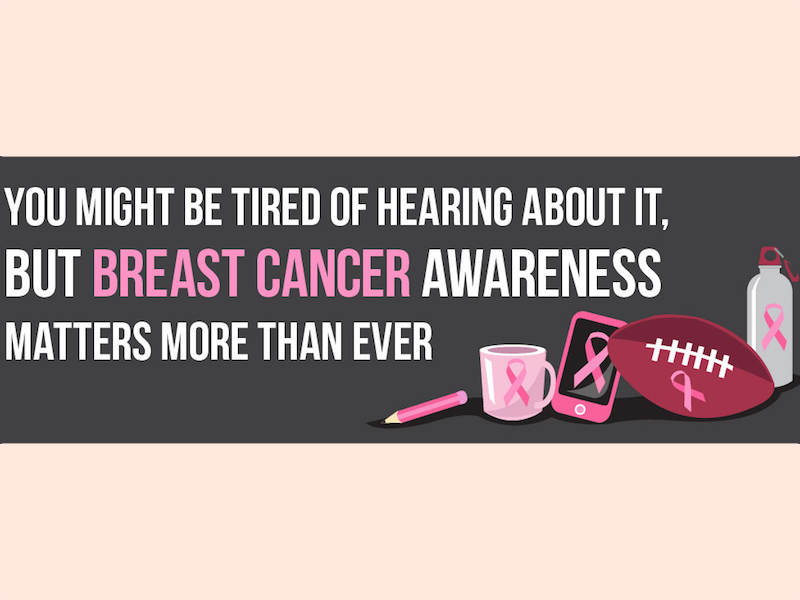Breast cancer awareness fatigue or not, cases of breast cancer continue to rise worldwide.
Written by Ann Pietrangelo
I know, I know. You’re sick of hearing about it. You’re as aware as you want to be and the color pink is getting to be a bit of a drag. Breast Cancer Awareness has us in its October grip. I’m sick of it, too. Sick of reading about and sick of writing about it. More than that, I’m sick of the fact that it or any other type of cancer exists. None of that prevented me from getting it, though, and it won’t prevent anyone else from getting it. And when you have breast cancer, it’s not all pink ribbons and pretty bows, I can tell you that.
October is a month I cannot ignore. I was born in October. During October 2010, I wrote a few articles about breast cancer, but it was a disease that had never touched me personally. Before the month was over, I would discover a lump in my own breast. Awareness suddenly took on an entirely new meaning. Because of Breast Cancer Awareness month, I knew a lot about breast cancer, but I had much to learn. I found out that breast cancer isn’t a single disease. There are many types of breast cancer and I had the triple-negative variety, a fact that would play a huge role in how to approach treatment. It was rough going for awhile.
This October, I’m celebrating my fourth birthday since diagnosis. Cancer-free, as far as I or anyone else knows. I can’t even begin to describe how grateful I am for that. Not everyone who gets breast cancer is so fortunate. Make no mistake about it — breast cancer kills. That’s why we’ve got to get beyond pink fatigue and continue to fight this and every other form of cancer. Not just in October, but all year long. Until we beat cancer.
You can’t completely eliminate the risk of developing breast cancer. Some factors, like genetics, gender, and age are not within your control. Fortunately, there are some things you can do to lower your risk. The Centers for Disease Control and Prevention (CDC) recommends the following:
- Maintain a healthy weight.
- Exercise regularly — at least four hours a week.
- Get plenty of sleep.
- Limit alcohol consumption to no more than one drink a day.
- Try to avoid exposure to radiation and chemicals that can cause cancer (carcinogens).
- Breastfeed your babies, if possible.
- Discuss the risks of hormone replacement therapy and oral contraceptives with your doctor.
Breast cancer is easier to treat when it’s diagnosed early. Know your family history and discuss screening tests with your doctor. If you discover a lump in your breast, remember that most breast lumps are noncancerous, but have it checked out right away. Please.
If you’re curious about triple-negative breast cancer, download this free brochure, “Guide To Understanding Triple Negative Breast Cancer,” provided by Living Beyond Breast Cancer and the Triple Negative Breast Cancer Foundation. Younger women diagnosed with breast cancer have a lot in common with older women with breast cancer, but some challenges are very different. Since more women are diagnosed after age 50, younger women may have a harder time finding the support they need. Beyond Boobs! is a unique women’s health initiative promoting two missions — to support women diagnosed with breast cancer before menopause and to provide breast health education to all. For more information, visit www.BeyondBoobs.org. If you’re interested in an up close and personal account of life with triple-negative breast cancer, please check out my book, “Catch That Look.”

Infographic provided by Plenty Consulting and Digital Third Coast. For more information, visit the Plenty Consulting Blog.



